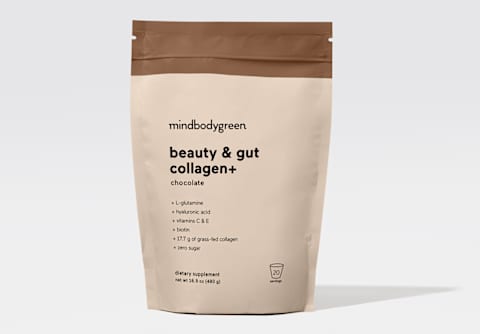Advertisement
7 Nutrients You Should Eat Daily For Long, Healthy Hair



Having long, healthy hair begins on the inside. In the same way that what you eat can affect your complexion, it can affect your hair growth. Hair is mostly created from the protein keratin, which is made up of amino acids. When we eat foods or take supplements abundant in these, they are broken down and absorbed in our gut, travel throughout our bodies, and then eventually reformed into cells. "The health of growing hair depends wholly on what we eat and break down in the bloodstream and the circulation of blood to the scalp, which may be improved by massage," explains hair stylist Lucy Vincent, who specializes in clean and natural haircare. Here are seven nutrients you should eat daily for your hair:
MSM
MSM is a sulfur that is naturally present in our bodies, as well as in certain plants. "It supports collagen and keratin, fundamental building blocks for skin, hair, and nails," explains Vincent.* "It is particularly high in the amino acid cysteine, a key element responsible for maintaining skin and hair tissue.* It also supports wound healing and is generally great for healthy skin, hair, bones, and connective tissue."* MSM-rich foods include cabbage, broccoli, cauliflower, kale, asparagus, onions, and garlic.
Collagen
Collagen powder is often hailed for its gut- and skin-supporting benefits.* It should be equally praised for supporting hair health.* Collagen is especially high in the amino acid proline, which is the primary amino acid in keratin1.* It is also thought to contribute to improved scalp health as well as help manage oxidative stress2.* Oxidative stress, recent research has found, is one of the primary causes of hair loss in humans. While you can find collagen in bone broth, the most effective way to consume it is through hydrolyzed collagen supplements.*
Protein
While collagen is a very specific type of protein, it's good to make sure you're getting complete proteins as well; it is essential for many functions in the body. Muscle mass tends to get the most attention, but it's vital for hair growth too. That's why one of the most common signs of protein deficiency is hair loss3. "Because hair is constructed mostly of protein [keratin], a diet of too little protein can advance the loss of pigment, causing grayness4," Vincent says. "A diet rich in high-quality, naturally occurring protein will do wonders for your hair."* You can find protein-rich foods like Greek yogurt, egg yolks, kale, peanuts, beans, peas, lentils, tofu, chicken, and turkey.
Zinc
Zinc helps hair via a few different pathways: growth, repair, and oil production in the scalp. "Supporting tissue growth and repair, zinc helps keep your scalp and hair healthy," Vincent explains.* "It also regulates hormones in the body [testosterone included] and helps maintain production of oil-secreting glands on the scalp that help your hair grow."* The latter is important because an unbalanced scalp can lead to inflammation; inflammation, in turn, leads to hair thinning. "Zinc is a vital micronutrient that's often overlooked. Zinc supports numerous enzymes in the body," says physician and mbg collective member Bindiya Gandhi, M.D. However, it's very important to speak to visit your doctor to get your levels tested before you start increasing the mineral on your own, she explains, "There's another side to this, as well, when too much exposure to zinc can cause GI upset, cognitive confusion, headaches, lethargy, as well as rashes." Zinc-rich foods include chickpeas, wheat germ, oysters, beef, veal liver, and roast beef.
B vitamins
Perhaps the most famous of the hair supplements is biotin. It's amassed a following thanks to a large body of both anecdotal and research-backed benefits.* "Biotin, niacin, and cobalamin are among the most popular B-complex vitamins that help support shine and thickness to hair strands," says Vincent.* Too little biotin can cause brittle hair and may lead to hair loss: "Thinning hair and hair loss are very common symptoms and can be supported with the addition of biotin.* This is especially true if you have low levels of biotin—which has been shown to lead to hair loss5," functional medicine practitioner and mbg Collective member William Cole, D.C., tells mbg. Vincent recommends eating B-vitamin-rich foods like whole grains, eggs, avocados, yeast, liver, and legumes. They're also a very common addition to hair-healthy supplements.*
Omega-3s
Omega-3 fatty acids are nourishing, inside and out.* "The essential nutrients reach both the hair shaft and the cell membranes in your scalp, nourishing the follicles and promoting healthy hair growth," says Vincent.* "Plus, they add elasticity to your hair, preventing breakage and some hair loss."* The body can't produce omega 3-fatty acids on its own, so it is vital to eat a diet rich in flaxseeds, walnuts, salmon, tuna, kale, Brussels sprouts, and small, fatty fish like anchovies.
Selenium
"Selenium is a trace element that helps the body make selenoproteins, which maintain reproduction, metabolism, DNA synthesis, and immunity.* It also supports hair follicles to encourage new growth.* Scrimp on selenium and you risk hair-follicle abnormalities, reduced growth, and hair loss," says Vincent. However, there's also evidence to suggest that too much of this element will lead to brittle, damage-prone hair6. The recommended amount is 400 mcg a day for optimal results7. Selenium-rich foods include Brazil nuts, tuna, halibut, shrimp, and sardines.
7 Sources
- https://www.sciencedirect.com/science/article/pii/S0079642515000596
- https://www.ncbi.nlm.nih.gov/pubmed/28266664
- https://www.ncbi.nlm.nih.gov/pmc/articles/PMC4828511/
- https://www.ncbi.nlm.nih.gov/pmc/articles/PMC6290285/
- https://www.ncbi.nlm.nih.gov/pubmed/19727438
- https://www.ncbi.nlm.nih.gov/pmc/articles/PMC6380979/#Sec12title
- https://ods.od.nih.gov/factsheets/Selenium-Consumer/

Why Nutrition Is Key To Changing Your Relationship With Alcohol
Brooke Scheller, DCN, CNS

Why Alcohol Sabotages Your Gut Health & How To Get Back On Track
Brooke Scheller, DCN, CNS

Why Nutrition Is Key To Changing Your Relationship With Alcohol
Brooke Scheller, DCN, CNS

Why Alcohol Sabotages Your Gut Health & How To Get Back On Track
Brooke Scheller, DCN, CNS

Why Nutrition Is Key To Changing Your Relationship With Alcohol
Brooke Scheller, DCN, CNS

Why Alcohol Sabotages Your Gut Health & How To Get Back On Track
Brooke Scheller, DCN, CNS

Why Nutrition Is Key To Changing Your Relationship With Alcohol
Brooke Scheller, DCN, CNS

Why Alcohol Sabotages Your Gut Health & How To Get Back On Track
Brooke Scheller, DCN, CNS















